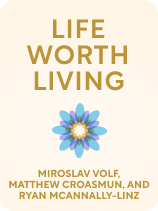

This article is an excerpt from the Shortform book guide to "Life Worth Living" by Miroslav Volf, Matthew Croasmun, and Ryan McAnnally-Linz. Shortform has the world's best summaries and analyses of books you should be reading.
Like this article? Sign up for a free trial here.
Do you believe that you’re essentially a good person? How do you measure your virtue?
According to authors Miroslav Volf, Matthew Croasmun, and Ryan McAnnally-Linz, life is worth living when you have a good philosophy of life. A strong life philosophy promotes moral well-being—the sense that you’re generally a virtuous person—by defining right and wrong behaviors.
Continue reading to learn about various perspectives on moral well-being.
Moral Well-Being
Volf, Croasmun, and McAnnally-Linz explain that many people believe they’ll be virtuous if they minimize the harm they do to others. But, this view of moral well-being doesn’t pass muster because, sometimes, you must harm others in order to do the right thing. To illustrate, the authors cite the spiritual war depicted in a Hindu text called The Bhagavad Gita. In this scripture, the god Krishna advises a man named Arjuna that he must harm his family to win the war for righteousness and against sin.
(Shortform note: The Bhagavad Gita provides some guidance about when and how it’s OK to hurt people—for example, it describes particular justifications for war and acceptable wartime conduct. It’s sometimes necessary to harm others in less dire circumstances, too. In All About Love, feminist philosopher bell hooks argues that your capacity to love others begins with self-love, which involves self-assertion: your ability to advocate on behalf of your own needs. Sometimes, self-assertion comes at the expense of others’ needs or desires. For example, you might hurt someone’s feelings by breaking up with them when they can’t meet your needs, but that doesn’t mean breaking up with them is immoral—you’re probably still doing the right thing.)
If you agree that moral well-being could sometimes demand harming others, your life philosophy might require a different behavioral standard than minimizing harm. One alternative is to judge your actions by their outcomes. The authors explain that utilitarians, for example, don’t care what you do so long as your actions promote pleasure and decrease pain. One problem with this approach is that the repercussions of your actions are often unpredictable. For example, if you’re not aware that some coffees are produced by forced laborers, you can’t predict that your purchase of that coffee might fuel the modern slave trade.
(Shortform note: If you decide it’s best to judge your actions by their outcomes, you might adopt what author Jeff Bell calls “the Greater Good Perspective Shift.” When you make decisions, don’t prioritize avoiding negative outcomes; instead, prioritize pursuing positive outcomes that fulfill others’ needs or enhance your sense of meaningfulness. For example, some psychologists believe it’s acceptable to tell a white lie to fulfill another person’s need for acceptance. To help you predict the repercussions of your actions, Peter Bevelin (Seeking Wisdom) recommends that you practice systems thinking: With the knowledge that you’re part of a complex web of life, try to understand how your actions will affect others.)
The authors say other thinkers are more concerned with the quality of your actions themselves. For example, the authors say that Jews, Christians, and Muslims believe the only way to act rightly is to obey God (whose will you can determine with the help of your spiritual community). Confucianists, on the other hand, believe that to act rightly is to promote a healthy society, which begins with healthy interpersonal relationships. Therefore, they emphasize treating people well.
(Shortform note: There’s a lot of overlap between the Abrahamic and Confucianist perspectives represented here. According to Judaism, Christianity, and Islam, obeying God necessarily involves treating people well since that is one of God’s commandments. And while Confucianists don’t believe in God, they believe in obeying the moral authorities they do recognize—like your ancestors, elders, and political powers—because following the social order without conflict promotes societal harmony, which is key to societal health. However, it’s important to note that what it means to treat people well is culturally dependent—for example, both Confucian and Abrahamic cultures have been criticized for treating women as inferior to men.)
Another facet of moral well-being is whom you should act rightly toward. The authors describe four answers to this question: First, the philosopher Charles Taylor says you are your highest priority, since you’re an individual, and you have a duty to fulfill your unique potential. In contrast, the utilitarian Peter Singer argues that since everyone’s pleasure is equally important, you should act rightly toward everyone, even perfect strangers. In practice, this could mean donating to poor people in other countries. Somewhat similarly, Christians believe you should act rightly with anyone you encounter, including strangers and people who are different from you. Finally, Confucianists believe that your family comes first but you should treat others well, too.
(Shortform note: In Against Empathy, psychologist Paul Bloom explains how empathy (your ability to feel what someone else feels) partially determines who you feel compelled to act rightly toward. He explains that many people use empathy to guide their moral decision-making without realizing empathy’s limits. For example, it’s easier to empathize with people you’re close to or similar to—like your family—than people who are different or distant from you. Empathy also takes an emotional toll on you and can make it hard to care for yourself even when that’s necessary. Instead of relying on empathy to make moral choices, Bloom advocates reasoned compassion: logically evaluating your concerns about others before you try to help them.)

———End of Preview———
Like what you just read? Read the rest of the world's best book summary and analysis of Miroslav Volf, Matthew Croasmun, and Ryan McAnnally-Linz's "Life Worth Living" at Shortform.
Here's what you'll find in our full Life Worth Living summary:
- What a life philosophy is and why you should have one
- The four key components of a good life philosophy
- Why contemplating death can motivate you to live more fully






